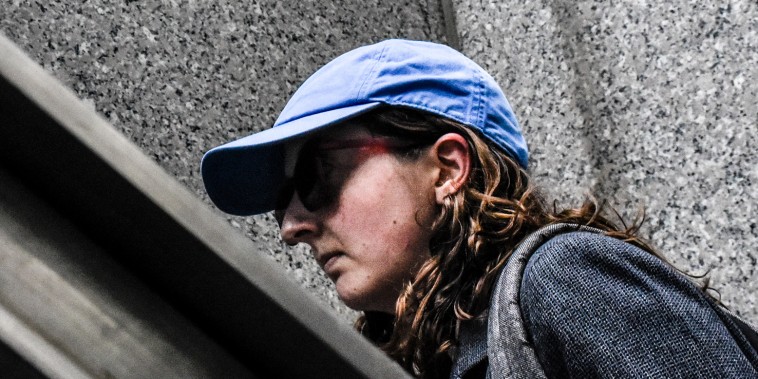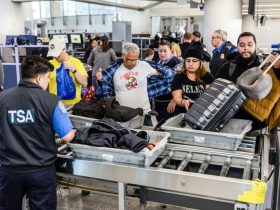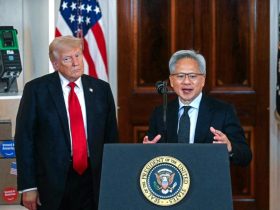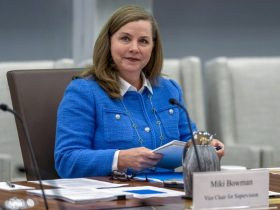Caroline Ellison testified that FTX cofounder Sam Bankman-Fried told her to steal money from FTX’s customers and use them to repay firms that had lent money to Alameda Research, the crypto trading firm Ellison was leading.
‘Sam directed me to commit these crimes,’ Ellison said in court on Tuesday, after telling prosecutors that she, Bankman-Fried, and others had committed fraud.
Ellison, who at various times also dated and lived with Bankman-Fried, said that Alameda took about $10 billion from customers who had put their money on the FTX exchange to trade digital currencies. She said Bankman-Fried set up the system that let her move the money.
She also said that Bankman-Fried directed her to send balance sheets to lenders that made Alameda’s losses look less risky.
Her testimony follows that of FTX cofounder Gary Wang, also a witness for the prosecution. Both were charged with a series of financial crimes in December, and Ellison pleaded guilty to two counts of wire fraud, two counts of conspiracy to commit wire fraud, conspiracy to commit commodities fraud, conspiracy to commit securities fraud and conspiracy to commit money laundering.
Bankman-Fried faces seven federal charges, including wire fraud, securities fraud and money laundering, that could put him in prison for the rest of his life. He is scheduled to face additional charges at a separate trial in March 2024. He has pleaded not guilty to all of the charges in both cases.
The Securities and Exchange Commission said in December that, at Bankman-Fried’s direction, Ellison manipulated the price of a digital token that FTX had issued, and then used it as collateral for undisclosed loans that Alameda took from FTX. That means Alameda, the trading firm, was secretly using money that belonged to FTX customers to repay debts and cover losses it had sustained.
That meant Alameda was telling investors it had more collateral to back up its loans than it really did, making the FTX exchange look safer than it was.
Ellison started at Alameda as a trader in 2018. She testified Tuesday that after the hedge fund suffered large losses that year, Bankman-Fried made getting more money a top priority. To that end, he told Alameda employees to get loans on any terms they could, and created the digital token, FTT. She said Alameda owned 60% to 70% of the supply of the coin, which cost essentially nothing to make. When its market price rose from an initial 10 cents to $50 over time, Alameda gained billions.
Ellison, who became co-CEO of Alameda in October 2021, said that Bankman-Fried told her to put those billions in FTT on the balance sheet so Alameda could borrow money, and that Bankman-Fried persuaded her to proceed even though she initially felt it was misleading.
Alameda later did the same with other coins.
She also testified that Alameda made some $5 billion in personal loans to company insiders. Some of those loans were risky because they could be called in at any time, and she said there were enough of them to bankrupt Alameda if they all became due and payable immediately.
While Ellison was officially in charge of Alameda, prosecutors say Bankman-Fried was calling the shots and was responsible for those schemes. Bankman-Fried’s lawyers have argued that Ellison was fully responsible and mismanaged the company.
For a short time, FTX was one of the biggest names during a boom in the digital currency industry. It struck sponsorship deals with sports teams and ran a star-studded Super Bowl commercial. Bankman-Fried’s personal wealth was estimated in the tens of billions, primarily because of his ownership stake in the company.
Alameda and FTX quickly collapsed in November 2022 after Coindesk reported on the tight links between the two firms and the liabilities Alameda had. One of FTX’s biggest rivals announced that it would sell its holdings of the digital token that comprised much of Alameda’s balance sheet, which caused its value to crater.
Then, nervous customers started pulling their money from the FTX exchange. FTX couldn’t give those customers their money back, in part because of the money it had lent to Alameda. It had to halt withdrawals, and within days, both companies filed for bankruptcy protection.
Ellison, like Wang before her, is cooperating with the government in exchange for a reduction in her sentence. Without such a deal, both faced sentences that could have kept them in prison for the rest of their lives.
Ellison and Wang both had close personal relationships with Bankman-Fried, or SBF, who appeared distressed at times by Wang’s testimony against him. Meanwhile Ellison was one of the first people Bankman-Fried recruited to work with him, in 2017. Before that, they were coworkers at a trading firm in New York.
Bankman-Fried was sent to jail in August in advance of the trial after the government accused him of witness tampering. He had purportedly leaked diary entries from Ellison to The New York Times.








